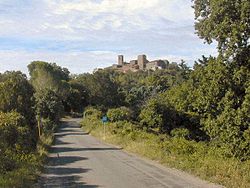Vetulonia
| Vetulonia | |
|---|---|
| Frazione | |

View of Vetulonia
|
|
| Location of Vetulonia in Italy | |
| Coordinates: 42°51′34″N 10°58′16″E / 42.85944°N 10.97111°ECoordinates: 42°51′34″N 10°58′16″E / 42.85944°N 10.97111°E | |
| Country |
|
| Region |
|
| Province | Grosseto (GR) |
| Comune | Castiglione della Pescaia |
| Elevation | 335 m (1,099 ft) |
| Population (2011) | |
| • Total | 254 |
| Demonym(s) | Vetuloniesi |
| Time zone | CET (UTC+1) |
| • Summer (DST) | CEST (UTC+2) |
| Postal code | 58043 |
| Dialing code | (+39) 0564 |
Vetulonia, formerly called Vetulonium (Etruscan Vatluna), was an ancient town of Etruria, Italy, the site of which is probably occupied by the modern village of Vetulonia, which up to 1887 bore the name of Colonnata and Colonna di Buriano: the site is currently a frazione of the comune of Castiglione della Pescaia, with some 400 inhabitants.
It lies 300m above sea level, about ten miles directly northwest of Grosseto, on the northeast side of the hills which project from the flat Maremma and form the promontory of Castiglione.
Vetulonia has Etruscan origins. It was, by 600 BC, part of the Etruscan League of twelve cities.Dionysius of Halicarnassus places the city within the Latin alliance against Rome in the seventh century BC. According to Silius Italicus (Punica VIII.485ff), the Romans adopted their magisterial insignia, the Lictors' rods and fasces and the curule seat, from Vetulonia; in 1898, a tomb in the necropolis was discovered with a bundle of iron rods with a double-headed axe in the centre, and soon afterwards, a grave stela inscribed for Avele Feluske was discovered, on which the fasces were pictured. Pliny the Elder and Ptolemy also mention the town. The rich votive furnishing from the two extensive necropoleis attest to the importance of Vetulonia's elite.
...
Wikipedia

